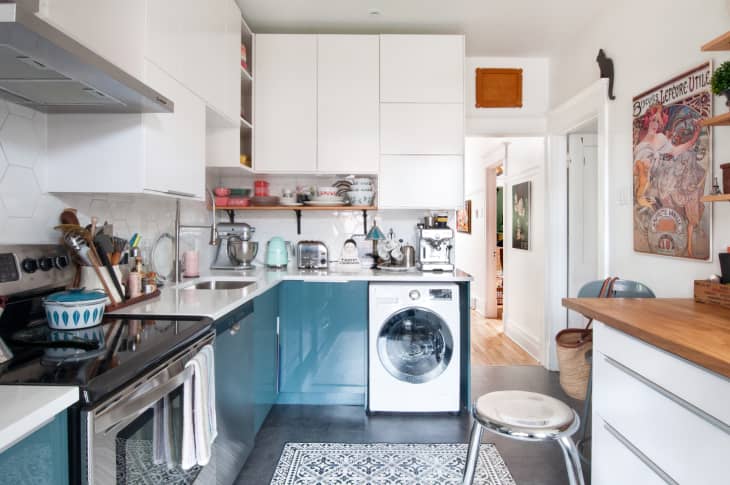My Friend Took a “Moral Stance” on Laundry, and It Changed the Way I Clean My Home

As a neurodivergent person, I’ve always had a love/hate relationship with keeping my home tidy. I can’t be trusted to clean sporadically throughout the day because I often get distracted from the original task I was doing. As a result, I usually save cleaning sprees for when I’m super stressed and overwhelmed by the clutter. Living in a perpetually messy space has made me feel like a failure, especially when it’s frustrated my partner or roommates.
I thought I’d always have this fraught relationship with tidiness until I got some hard-hitting advice from my good friend, Brie. We’d met in an ADHD support group and I knew full well she had a full roster of distractions as a mother of two. Instead of scolding me about my propensity to get distracted while cleaning, she simply offered a kind alternative:
“Having a clean home is morally neutral. You’re totally overthinking it and driving yourself [wild] in the process.” This philosophy — having a “morally neutral” clean home — was first created and popularized in 2020 by KC Davis, a licensed therapist, speaker, and author of Amazon bestseller “How to Keep House While Drowning.”
Davis rose to fame during March 2020, in the early days of the pandemic when, after the birth of her second child, she turned to TikTok (@domesticblisters) and Instagram (@strugglecare) to share the daily challenges she faced trying to keep her home clean and maintained while also resisting the urge to feel guilty or depressed when she was unable to do so. Her message resonated, and she quickly amassed more than a million followers. In April 2022, Davis released her first book and in October of that same year, she presented her first TEDx Talk, “How to Do Laundry When You’re Depressed.” Her honest, funny, and kind approach to self-care continues to inspire a global audience.
Through her social handles, books, and website she openly discusses the importance of what she calls “struggle care,” which is a type of do-what-you-can self-care and housekeeping advice for neurodivergent people who have difficulties keeping up with daily housekeeping tasks. Davis’ focus is on the invisible and visible weight we all carry when it comes to keeping up with “care tasks,” which she categorizes as “any task, chore, or errand that is required to care for self and keep life going,” that are typically “recurring, never-ending, and are required to be completed in order to ‘get on with living.'” Her premise is simple: These care tasks are “morally neutral” because being very good or bad at them has absolutely zero to do with your worth as a person or parent.
That didn’t make a whole lot of sense at the time, so Brie elaborated by sharing her laundry routine with me, which is heavily inspired by Davis’ advice. She explained Davis didn’t fold her children’s clothes because she believes the most important aspect of doing laundry is getting the clothes clean, not folding them, and that wrinkled clothing does not equal “failure.” Instead of focusing on doing laundry perfectly, Davis focuses on making it functional. At 3 and 4, Brie shared that her kids didn’t care if their clothing was wrinkled either, and they’d likely stain it anyway so she created a laundry bin system, similar to the one Davis popularized, where she sorted garments by size (because her younger child could wear their sibling’s clothes if needed, but not the other way around), taking it a step further than Davis’ advice to separate bins by person. Brie also had bins for her and her husband’s underwear and pajamas.
This system transformed doing laundry from an hour-long process to one she could do in minutes. With this example, she drove this belief system home: Cleaning the clothes was important; folding them was not.
With that advice in mind, I’ve also reframed my cleaning routine to allow me to decide what is or isn’t helpful to my household. I tend to use a lot of bins around my house to keep clutter off the floor and I’d previously always made sure my dog’s toys were placed in a single toy box in the living room. However, now, I’ve placed a few different boxes throughout my space to always make sure there are no tripping hazards. Having “one place” for the toys is morally neutral; a safe path to walk isn’t.
Using bins, like Davis recommends, helps me prioritize parts of my routine in a way I can understand. I have a basket on the kitchen counter where I place things that “belong” in other rooms. Things like sunglasses, phone chargers, and spare socks go in that bin until I have a day where I can devote time and energy to putting them in their proper place. This bin system helps make sure my counter is a safe place, as Davis calls it, to prepare meals, while saving my partner the frustration of living in a cluttered space.
These systems aren’t an indictment of my failure to be tidy as a neurodivergent person. It’s a way I can accept myself the way I am, and ultimately, make my home a safer, more pleasant place to be.